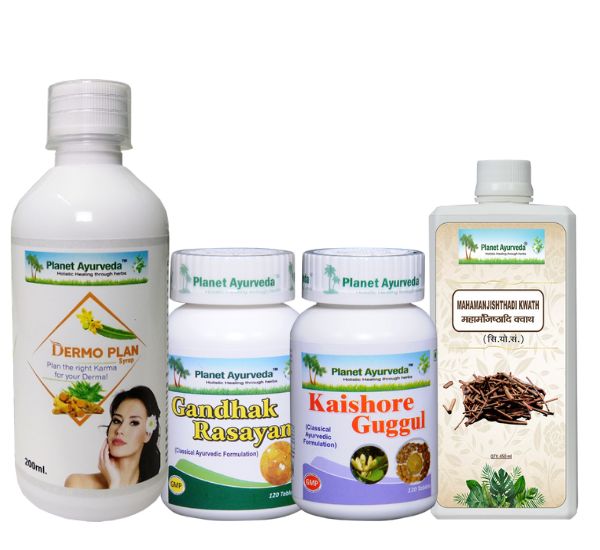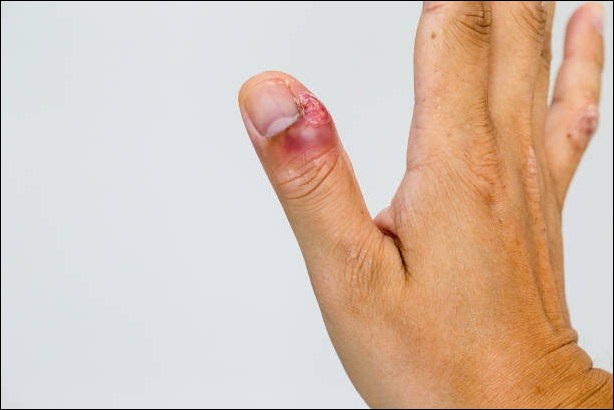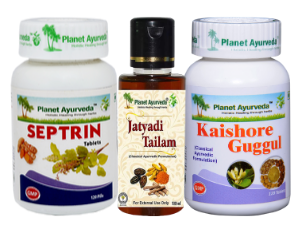Pythiosis Symptoms, Causes And Treatment With Ayurveda
Abstract
Pythiosis is a rare water mold disease that mostly affects household animals like- dogs, cats, and horses, but this disease can also hamper humans in some cases, through the transmission of infection from pets to owners. This disease was first seen in the US and was named Swamp Cancer due to its life-threatening symptoms. The severe cases show symptoms like skin necrosis and skin-wasting. In this article, we will discuss the causative agent and the symptoms of this fatal disease. We shall also be discussing the diagnostic criteria and treatment for this disease. In the end, we will discuss what Ayurveda offers in the treatment of such infectious diseases.

Introduction
Pythiosis caused by a water parasite affects the body of the infected animal in certain ways. It hampers various systems functioning simultaneously. Respiratory tract issues, gastrointestinal tract problems, skin problems, lymph node problems, brain-related neurological issues, etc are noticed. Ignorance of these abnormalities could lead to severe symptoms that are hard to treat. The agent enters the body and settles in the respiratory tract through which it spreads to different parts of the body including the brain. The infectious agent causes the development of cutaneous masses in the abdomen or other body areas as an abnormal symptom.
Ayurvedic Aspect
According to Ayurveda, we can consider Pythiosis a Krimi rog that is caused by an infectious Krimi (Parasite) that enters the body and compromises the whole immune system of the host. These parasites (a type of Krimi) enter and replicate inside the body, causing irritant symptoms. Krimi’s will reach different body areas through the circulatory system and will hamper the normal functioning of different body organs and systems including the respiratory, neurological, gastrointestinal system, etc. Krimi decreases the immunity in a person and creates an imbalance in all three Vatadi doshas.
Causes
The main causative agent for Pythiosis is a water-borne fungal parasite
- Pythiosis insidiosum of genus Pythium. It is a parasitic spore that enters the body through the respiratory route or the skin.
Symptoms
The symptoms of Pythiosis in animals include
Respiratory tract problems
- Fever
- Cough
- Headache
- Sinuses
Gastrointestinal tract issues
- Vomiting
- Regurgitation
- Diarrhea
- Abdominal pain
- Loss of appetite
- Abdominal mass
Skin problems
- Swollen skin areas
- Wounds
- Nodules (pus-filled)
- Necrosis
- Wasting of skin
- Weight loss
- Enlarged lymph nodes
Diagnosis
The diagnosis is made through complete history taking and physical evaluation. Along with it, some lab tests are also recommended by the doctor for the confirmation of particle agents and disease
- History taking
- Physical examination
- Complete blood count
- Blood culture
- Urinalysis
- ELISA test
- Abdomen Ultrasound
- Ruling out the enlarged lymph nodes
- Biopsy of abdominal mass
- Dog’s Deoxyribonucleic acid test is indicated in some cases for confirming the diagnosis.
Treatment
Treatment should be started as soon as possible to minimize the loss. Symptomatic treatment is done to reduce different abnormal body symptoms.
- Medications like Anti-fungal drugs are recommended for six months or more
- Most of the pets are recovered through medications, while some may need more treatment options
- Immunotherapeutic vaccines could help to prevent these diseases
- Photoblation
- Surgery is indicated to remove the extra abdominal mass or mass in other body areas
Herbal remedies by Planet Ayurveda for Pythiosis
Planet Ayurveda is well known for its natural manufacturing of Ayurvedic medicines. This company has been preparing medicines for the last two decades. The quality and purity of the medicines are trusted worldwide. The medicines are too pure to be used in the treatment of animal and human diseases without any differentiation.
Here are some ayurvedic medicines listed that are recommended by us for the treatment of Pythiosis in animals.
Product List
1. Gandhak Rasayan
2. Mahamanjishthadi Kwath
3. Kaishore Guggul
4. Dermo Plan Syrup
Product Description
1. Gandhak Rasayan
This patent Rasayan preparation of Planet Ayurveda is prepared from pure Sulphur- (Gandhak. This satanic drug is an effective option to balance all three imbalanced Vata, Pitta, and Kapha doshas. These tablets are recommended for pets (dogs, horses, cats) suffering from Pythiosis to overcome respiratory issues by maintaining proper airflow. These Gandhak tablets will increase the overall body immunity that will help to ease the other abnormal symptoms of the stomach, skin, and brain.
2. Mahamanjishthadi Kwath
This is a syrup preparation made using Manjishtha (Rubia cordifolia) which is a wonderful ayurvedic herb that detoxifies the body and eases all the toxins from the blood. Combining this wonderful herb with other herbs like- Nagarmotha (Cyperus rotundus), Bharangi (Clerodendrum Serratum), Bach (Acorus calamus), Bahera (Terminalia bellirica), Kutki (Picrorhiza kurroa), Murva (Marsdenia tenacissima), Saal (Shorea robusta), Vijaysaar (Pterocarpus marsupium), Khair (Acacia catechu), Rakta Chandan (Pterocarpus santalinus), Bakayan (Melia azedarach), Atees (Aconitum heterophyllum), and many more herbal medicines along with Dhay flower (Woodfordia fruticosa) and Gurr (Saccharum officinarum) are used for the preparation of this wonderful acting kwath and treats the disease by increasing its medicinal properties.
Dosage- Give 2 teaspoons of syrup twice daily.
3. Kaishore Guggul
These wonderful acting tablets are prepared with Vidanga (Embelia ribes), Indian jalap (Ipomoea turpethum), etc herbs along with the main herb Guggul (Commiphora mukul). These tablets will manage Vataj and Pittaj disorders effectively due to the presence of a mixture of herbs like- Red physic nut (Baliospermum montanum), Ginger (Zingiber officinalis), Amalaki (Emblica officinalis), etc. This tablet preparation is a good preliminary formula for swamp cancer.
Dosage- Give 2 tablets twice daily.
4. Dermo Plan Syrup
This is an Ayurvedic syrup of Planet Ayurveda especially indicated for the treatment of skin disorders. Pythiosis is a fungal disorder that affects the skin and many internal body organs. Consumption of this syrup regularly will recover the disease by overcoming the abnormalities caused in the body of the infected pet. For the preparation of this syrup, many herbal extracts of different herbs are used including- Neem (Azadirachta indica), Gorakhmundi (Sphaeranthus indicus), Haridra (Curcuma longa), etc.
Dosage: Give 2 teaspoons of syrup twice daily.
CONTACT PLANET AYURVEDA TO PROVIDE YOU WITH THE COSTING / ORDERING AND DELIVERY INFORMATION AT – COSTING.PLANETAYURVEDA@GMAIL.COM OR CALL AT +91-172-5214040
Conclusion
Pythiosis is possibly recovered without extra concern, but total negligence about its treatment can prove fatal. To avoid additional side effects of modern medicines, you must go for a safe and side effects-free treatment option. The Ayurvedic medicines are potent enough to deal with these parasitic viruses and eradicate them from the body of your beloved pet (Dog, cat, horse, or any other). To get more information regarding these diseases you can contact us at www.planetayurveda.com




